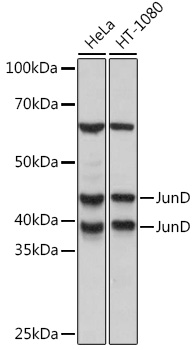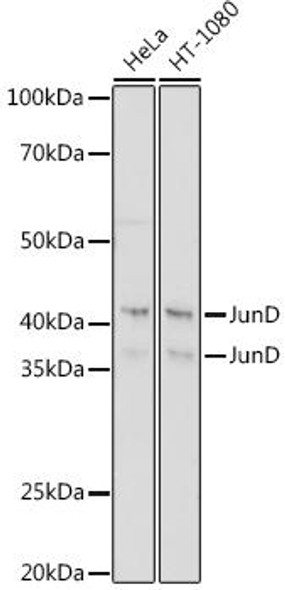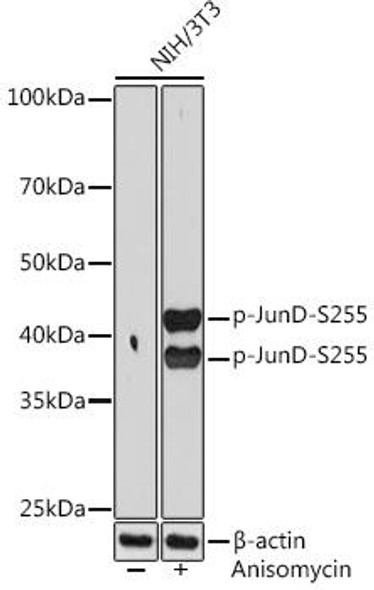Epigenetics & Nuclear Signaling Antibodies 5
Anti-JunD Antibody (CAB5433)
- SKU:
- CAB5433
- Product Type:
- Antibody
- Reactivity:
- Human
- Reactivity:
- Mouse
- Reactivity:
- Rat
- Host Species:
- Rabbit
- Isotype:
- IgG
- Research Area:
- Epigenetics and Nuclear Signaling
Description
| Antibody Name: | Anti-JunD Antibody |
| Antibody SKU: | CAB5433 |
| Antibody Size: | 20uL, 50uL, 100uL |
| Application: | WB |
| Reactivity: | Human, Mouse, Rat |
| Host Species: | Rabbit |
| Immunogen: | A synthesized peptide derived from human JunD |
| Application: | WB |
| Recommended Dilution: | WB 1:500 - 1:2000 |
| Reactivity: | Human, Mouse, Rat |
| Positive Samples: | HeLa, HT-1080 |
| Immunogen: | A synthesized peptide derived from human JunD |
| Purification Method: | Affinity purification |
| Storage Buffer: | Store at -20'C. Avoid freeze / thaw cycles. Buffer: PBS with 0.02% sodium azide, 0.05% BSA, 50% glycerol, pH7.3. |
| Isotype: | IgG |
| Sequence: | Email for sequence |
| Gene ID: | 3727 |
| Uniprot: | P17535 |
| Cellular Location: | |
| Calculated MW: | 38, 42kDa |
| Observed MW: | 38KDa/42KDa |
| Synonyms: | AP-1 |
| Background: | The protein encoded by this intronless gene is a member of the JUN family, and a functional component of the AP1 transcription factor complex. This protein has been proposed to protect cells from p53-dependent senescence and apoptosis. Alternative translation initiation site usage results in the production of different isoforms (PMID:12105216). [provided by RefSeq, Nov 2013] |
| UniProt Protein Function: | JunD: Transcription factor binding AP-1 sites. Binds DNA as a dimer. Interacts with MEN1; this interaction represses transcriptional activation. Belongs to the bZIP family. Jun subfamily. |
| UniProt Protein Details: | Protein type:Transcription factor; Motility/polarity/chemotaxis Chromosomal Location of Human Ortholog: 19p13.2 Cellular Component: chromatin; nuclear chromatin; nucleus; transcription factor complex Molecular Function:enzyme binding; ligand-dependent nuclear receptor binding; protein binding; transcription coactivator activity; transcription factor binding Biological Process: aging; cellular response to hormone stimulus; circadian rhythm; negative regulation of transcription from RNA polymerase II promoter; osteoblast development; positive regulation of cell differentiation; positive regulation of osteoblast differentiation; positive regulation of transcription from RNA polymerase II promoter; regulation of cell cycle; regulation of cell proliferation; regulation of transcription from RNA polymerase II promoter; response to cAMP; response to cytokine stimulus; response to drug; response to light stimulus; response to lipopolysaccharide; response to mechanical stimulus; response to peptide hormone stimulus; response to radiation; transcription from RNA polymerase II promoter |
| NCBI Summary: | The protein encoded by this intronless gene is a member of the JUN family, and a functional component of the AP1 transcription factor complex. This protein has been proposed to protect cells from p53-dependent senescence and apoptosis. Alternative translation initiation site usage results in the production of different isoforms (PMID:12105216). [provided by RefSeq, Nov 2013] |
| UniProt Code: | P17535 |
| NCBI GenInfo Identifier: | 229462969 |
| NCBI Gene ID: | 3727 |
| NCBI Accession: | P17535.3 |
| UniProt Secondary Accession: | P17535,Q53EK9, |
| UniProt Related Accession: | P17535 |
| Molecular Weight: | 35,174 Da |
| NCBI Full Name: | Transcription factor jun-D |
| NCBI Synonym Full Names: | jun D proto-oncogene |
| NCBI Official Symbol: | JUND |
| NCBI Official Synonym Symbols: | AP-1 |
| NCBI Protein Information: | transcription factor jun-D |
| UniProt Protein Name: | Transcription factor jun-D |
| Protein Family: | Transcription factor |
| UniProt Gene Name: | JUND |
| UniProt Entry Name: | JUND_HUMAN |







